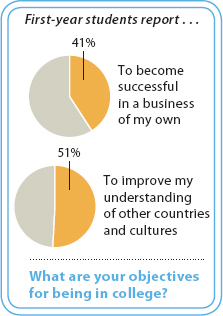Why College Is Important for You

College is about thinking, and it will help you understand how to become a “critical thinker,” someone who doesn’t believe everything he or she hears or reads but instead looks for evidence before forming an opinion. Developing critical-thinking skills will empower you to make sound decisions throughout your life.
Although college is often thought of as a time when traditional-age students become young adults, we realize that many of you are already adults. Whatever your age, college can be a time when you take some risks, learn new things, and meet new and different people, all in a relatively safe environment. It’s OK to experiment in college, within limits, because that’s what college is designed for.
College will provide numerous opportunities for developing a variety of social networks, both formal and informal. These networks will help you make friends and develop alliances with faculty members and fellow students who share your interests and goals. Social networking Web sites (such as Facebook and Twitter) provide a way to enrich your real-life social networks in college.
College definitely can and should be fun, and we hope it will be for you. You will meet new people, go to athletic events and parties, build camaraderie with new friends, and feel a sense of school spirit. Many college graduates relive memories of college days throughout their lives, fanatically root for their institution’s athletic teams, return for homecoming and class reunions, and encourage their own children to attend their alma mater. In fact, you might be a legacy student, someone whose parents or grandparents attended the same institution as you do.
In addition to being fun, college is a lot of work. Being a college student means spending many hours studying each week, staying up late at night, taking high-stakes exams, and possibly working harder than you ever have. For many students college becomes much like a job, with defined duties, expectations, and obligations.
Most important is that college will be a set of experiences that will help you to further define and achieve your own purpose. You might think that you know exactly what you want to do with your life and where you want to go from here. Or, like many students, you might be struggling to find where you fit in life and work. It is possible that as you discover more about yourself and your abilities, your purpose for coming to college will change. In fact, the vast majority of college students change their academic major at least once during the college years, and some students find that they need to transfer to another institution to meet their academic goals.
How would you describe your reasons for being in college and at this particular college? Perhaps you, like the vast majority of college students, see college as the pathway to a good job. Maybe you are in college to train or retrain for an occupation, or maybe you have recently experienced an upheaval in your life. Perhaps you are here to fulfill a lifelong dream of getting an education, or maybe you are bored or in a rut and see college as a way out of it. As it happens, many students enter college without a purpose that has been clearly thought out. They have just been swept along by life’s events, and now here they are.
OUTCOMES OF THE COLLEGE EXPERIENCE
In its report “Education Pays 2010,” the College Board includes the following as outcomes of having a college education:
- You will be more marketable professionally, have a more stable job history, achieve more promotions, and be less likely to be involuntarily unemployed than those without a college education.
- You will learn how to accumulate knowledge.
- You will be more likely to seek appropriate information before making a decision. You are less likely to be duped, conned, or swindled. Seeking information will also help you realize how our lives are shaped by global, local, political, social, psychological, economic, environmental, and physical forces.
- You will grow intellectually through interactions with cultures, languages, ethnic groups, religions, nationalities, and socioeconomic groups other than your own. You will participate more in and enjoy the arts.
- You will gain self-esteem and self-confidence, which will help you realize how you might make a difference in the world. You are more likely to become a leader in your community and employment setting.
- You will tend to be more flexible in your views, more future-oriented, more willing to appreciate differences of opinion, and more interested in political and public affairs. You will be more likely to be elected to public office.
- If you have children, you will likely have fewer than nongraduates, you will be more involved with their school lives, and your children will be more likely to have greater learning potential, which in turn will help them achieve more in life. You will be more likely to stay married longer to the same person.
- You will be an efficient consumer, save more money, make better investments, and be more likely to spend money on your home and on intellectual and cultural interests as well as on your children.
- You will be better able to deal with bureaucracies, the legal system, tax laws, and advertising claims.
- You will be more involved in education, hobbies, and civic and community affairs.
- You will be more concerned with wellness and preventive health care. Through diet, exercise, stress management, a positive attitude, and other factors, you will live longer and suffer fewer disabilities. You will be less likely to use tobacco products or become dependent on alcohol or drugs.